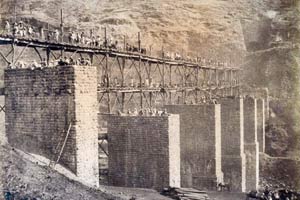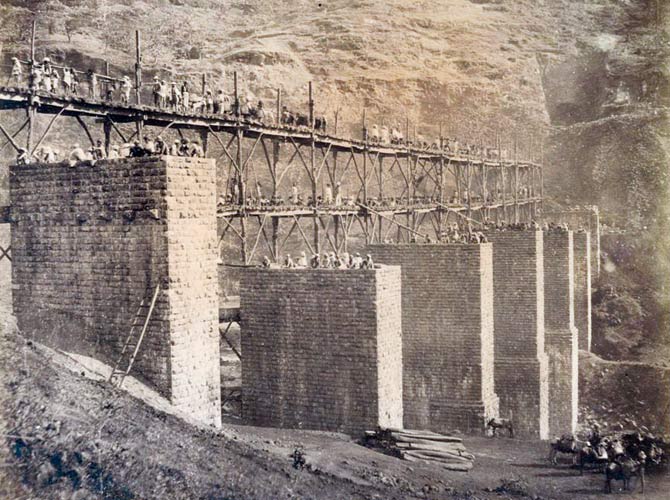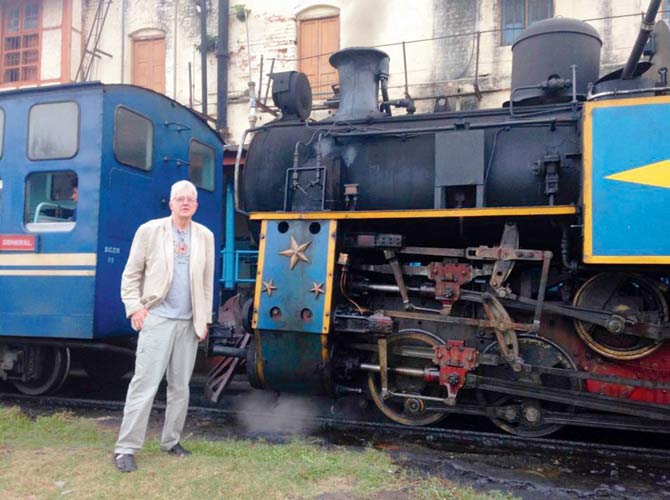In a new book, a veteran British writer examines the complicated legacy of the Indian Railways, while chronicling its brutal and bloodied history


The construction of the railway through the ghats to the east of Bombay, while being one of the great engineering achievements of the age, engendered terrible losses, through accident and disease. Pics courtesy/Railways and the Raj, Atlantic books
ADVERTISEMENT
When we reach out to London-based railway historian Christian Wolmar, 68, on a weekday morning, he is busy preparing for a lecture on Indian Railway history at the Oxford Literary Society. With barely few hours left for the event, he tells us over phone, how he is looking forward to discussing his research, which took him over a year, and has now culminated in a voluminous historical non-fiction, titled Railways and The Raj (Atlantic Books). "There are too many shocking stories that need to be shared," Wolmar informs. What his new book also does is challenge, in many ways, the long-held notion that the British gave India its first-ever transport system.

Author Christian Wolmar in front of a steam locomotive of the Nilgiri Mountain Railway during a visit to India
"The fundamental questions that we need to ask is why the British built the railways, to what extent was it really helpful for India and how much was done for Britain's own benefit. The intent was definitely not altruistic," explains Wolmar, who is also a veteran journalist specialising in transport. "Many of the likes of Boris Johnson [secretary of state for foreign affairs, UK] might say we built the railways for the Indians. No, we didn't. We build the railways because they enabled us to export raw materials and import manufactured goods, and by the by, it also gave India a fantastic transport system. But, that was never the objective. We need to document this history so that the same mistakes aren't repeated," he explains.
While it's a known fact that the task of building India's complex railway network was merely an exercise in the interest of the Empire, Wolmar's book exhaustively chronicles the brutal and bloodied history behind its creation. Wolmar speaks of how the Bhor Ghat project on the Western Ghats - one of the most perilous projects due to the ever-present danger of "falling rocks, slips and cave-ins" - cost 25,000 lives, a majority due to illness and disease, proving the appalling conditions in which Indians worked. What made it worse was when the Bhor Ghat project was finally completed, Sir Bartle Frere, the then Governor of Bombay, "lauded the work of the English engineers, while rather forgetting, until the last, that it was Indian labour that had created this almost miraculous railway," writes Wolmar in the book.
"The Railways could have easily been something that the British did with the Indians, and therefore, worked to both help India and its people. Instead, the British built the railways with their companies that profited from it," says Wolmar. "They didn't even treat Indians as equals, and it's very telling that they didn't allow them to drive the trains, and wouldn't let them be station masters or run the services. That's just ridiculous given that India would eventually take over the Railways post Independence. Fortunately, they got the railways going very quickly and efficiently, and built more networks," he adds.
Wolmar, who has made over dozens of visits to India, including spending three weeks just criss-crossing the length and breadth of the country on trains as part of his research, says Indian Railways today boasts of an "impressive network". "Yes, it does need more investment, but the fact that the railways still continues to be absolutely vital to India and its people, is what is most fascinating," Wolmar says.
Catch up on all the latest Mumbai news, crime news, current affairs, and also a complete guide on Mumbai from food to things to do and events across the city here. Also download the new mid-day Android and iOS apps to get latest updates
 Subscribe today by clicking the link and stay updated with the latest news!" Click here!
Subscribe today by clicking the link and stay updated with the latest news!" Click here!











